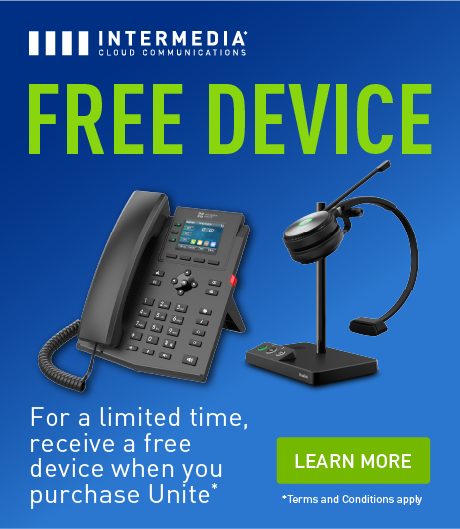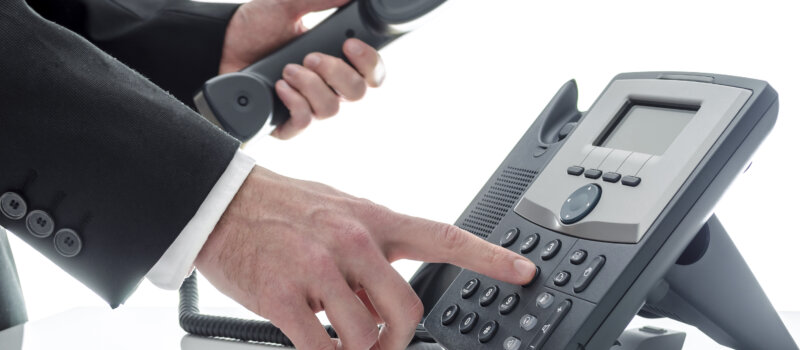Effective business communications can help differentiate a company from its competitors. A key step toward more professional communications is getting a business phone number. In addition to making your company appear more professional, a business phone number makes it easy for new and existing customers to contact the organization and can even boost brand recognition.
Starting and scaling a business already takes considerable investment, and both small business owners and large corporations can relate to exploring ways to save. As such, businesses may seek a free business phone number that offers many of the same benefits as paid options. Discover more about business phone numbers and how to acquire them.
What Is a Business Phone Number?
A business phone number provides an official means of contact that customers, partners, and other parties can dial to reach your organization. While a startup may only have one business phone number at first, many add numbers as the business grows. This makes it easier to direct customer calls to the right department. For instance, a company may have separate lines for sales and customer service.
Today, most businesses use virtual phone numbers. These numbers are accessible from any location or device with an internet connection and help companies meet various business needs.
Why Get a Business Phone Number?
Advancements in communication technology have given businesses numerous ways to connect with customers, such as email, video conferencing, and chatbots. However, phone calls offer a human element that many customers prefer over other communication methods. According to a report from Business Wire, 32% of customers and businesses say they prefer phone calls over email (20%), text messaging (12%), and others.
Given the preference for phone calls, businesses want to ensure their telephone numbers are reliable. Some entrepreneurs may use personal phone numbers when starting, but this may come off as unprofessional to some potential customers. When business owner(s) can’t make it to the phone in time, customers receive a voicemail like they would when contacting family or friends. Granted, building relationships is essential to customer loyalty, but an unprofessional initial contact can rub some prospects the wrong way. Instead, an official business phone number builds credibility with your customer base.
A business phone can also enhance branding because it centralizes business calls. With a designated number for each department, customers, partners, and other stakeholders know what number to dial and receive the same message on the other end. They aren’t left guessing if they’ve dialed the right number, which can happen when businesses rely on personal numbers.
Types of Business Phone Numbers
Different types of business phone numbers suit the various needs of different organizations. Learn more about these types to determine the best option for your company:
Toll-Free Numbers
Businesses with a national reach and want to expand should consider toll-free calling. This business phone system provides a number with a fixed, three-digit prefix that indicates the company owns the toll-free phone number. In other words, the business pays for the call and not the customer. We all recognize the prefix 800; this is a toll-free phone number. Other prefixes for toll-free calling include 888, 887, 886, and so on.
You might be able to access toll-free numbers through your current phone number provider. If not, you can purchase toll-free numbers from entities called Responsible Organizations (RespOrgs) or other business phone system providers. If browsing service providers, consider the additional features they offer. For example, providers typically allow organizations to forward toll-free numbers to existing business phone lines, allowing them to continue fielding calls from former numbers.
Toll-free calling encourages more customers to call since they won’t incur a fee. What’s more, toll-free numbers can help establish a business, which is crucial when building credibility. The cost for businesses is usually reasonable and increases for companies that experience higher call volumes and need more bandwidth.
Although some toll-free phone numbers allow for international calling, it might come at a higher cost. Other options might be more beneficial for international businesses.
Vanity Phone Numbers
Vanity phone numbers combine great branding with enhanced communications. Just as 1-800 numbers are common, we’re all familiar with companies selecting digits that spell out a phrase. A famous example with a corresponding jingle is 1-800-CONTACTS, which is 1-800 266-8228 for customer service.
To get a vanity phone number, reach out to your phone provider. They might help you find a vanity phone number with a local area code. You can also explore toll-free vanity numbers.
Vanity numbers can make remembering a number easier since customers just need to know the prefix and the word to find the matching numbers on their keypad. They also indicate the types of products and services your company offers. So, even if a customer doesn’t require your products or services right now, seeing your number can remind them who to call when the time comes.
The main challenge with vanity phone numbers is that many are already taken. If you sell contact lenses and other eyewear, you can’t use 1-800-CONTACTS. However, this also presents the opportunity to get creative. You can’t go with the obvious choice, but a unique vanity number might be more memorable. For instance, if you have a short, one-word company name or use an acronym, consider making that part of the vanity number.
Another consideration is cost. The personalization factor tends to make vanity numbers more expensive than standard toll-free or local numbers. However, the benefits of branding can make it worth the investment.
Local Phone Numbers
For small businesses that target a local area, local phone numbers are ideal. These numbers have a local area code, whether it’s a state, city, or county. It’s popular among restaurants, real estate agents, home service companies (plumbers and HVAC), and other local businesses that typically don’t serve outside a city or region.
Obtaining a local phone number is like getting a personal phone number. You contact your cable provider or a local phone company to get a phone number with a local area code. Although you will likely incur a fee for a local phone number, there are some free options to explore.
The main purpose of a local phone number is to increase a company’s local presence. When customers recognize a number’s area code, it builds trust. They’re more likely to call these businesses with questions or to schedule an appointment.
International Business Phone Numbers
Businesses targeting an international audience need additional capabilities beyond what other phone numbers can provide. International business phone numbers are for large organizations with multiple locations in different countries. These phone numbers enable the company to establish a local presence in these countries with a different code for each country. These numbers can be toll-free or local.
Service providers may include some international minutes in their plans, but generally, they charge according to the country’s per-minute rates. International organizations want to research their options to find the most cost-effective choice that meets their communication needs.
Direct Inward Dial (DID) Numbers
Direct inward dial (DID) numbers benefit companies with many employees or experience high daily inbound call volumes. Under this business phone system, organizations purchase DID numbers from the phone company or service provider and assign them to extension lines. When a customer dials the DID number, it automatically routes them to the correct extension.
DID numbers are especially helpful for call routing. They can route calls to any type of business phone, whether VoIP phones, landlines, or mobile phones. Companies typically use them with call forwarding so incoming calls are routed to the right department or person even if the employee isn’t available or it’s outside business hours.
DID numbers make for a better customer experience when contacting the business. They prevent callers from needing to sit through Interactive Voice Response (IVR) menus, which aren’t helpful when customers know who or what department they need to contact. DID numbers can also reduce the number of missed phone calls and eliminate the need for switchboard operators, which helps save costs.
VoIP Phone Numbers
Analog phone services that rely on physical lines don’t meet the demands of today’s business communications. That’s why more organizations use Voice over Internet Protocol (VoIP). This communications technology uses the internet to transmit calls instead of traditional phone lines. VoIP phones compress multimedia information into packets of data for online transfer. On the other end, VoIP phones decompress data to receive information.
Many VoIP phones have additional features like call forwarding, voicemail transcription, and SMS text messaging that enhance communications. Other benefits of VoIP services include:
- Easy to install or migrate from another service provider with little or no downtime
- Flexibility to transfer calls between devices and locations for remote and hybrid teams, as well as team members who are frequently on the go
- Increase or decrease lines and adjust the number of users or features for increased scalability
- Advanced security to protect sensitive data and meet compliance standards
- Integration with existing software for greater productivity and performance
Why Get a Free Business Phone Number?
Costs for phone plans will vary depending on your organization’s needs, regardless of which type of business phone number you choose. However, starting with a free business phone number is often the best choice for small businesses. Even if you plan to scale up operations, starting with a free number helps save costs when extra capabilities aren’t necessary.
You don’t have to feel stuck with a free business phone number. Most service providers offer paid add-ons. By this point, you’ll know better how customers and other stakeholders prefer to communicate and can invest in the services that will best help you meet these demands.
Before settling on a free business phone number, think about the volume of calls you currently field or expect to field. Other factors to consider include:
- Type of phone service (landline, mobile phone, both)
- Scope of customer base (long-distance or international calling)
- How many phone numbers you need
- Additional features (voicemail, call forwarding, etc.)
Must-Have Business Phone Number Features
A virtual phone system is only beneficial if it has the features you need to meet unique communications needs. Organizations want to understand how customers, partners, and other parties prefer to experience calls and explore options accordingly. Although every business is different, the following are must-have functions for most companies:
Auto Attendant
Like IVR menus, auto attendants use voice prompts to direct customers to the right department or employee. They help with call routing, ensuring customers don’t get frustrated being on hold for too long. Companies may consider customizing auto attendants by having professional voice artists record voice prompts. This can give the feature more personalization and sound less computer-generated.
Call Forwarding
Use call forwarding to direct calls to the right device, whether it’s a home phone or personal cell phone. Call forwarding helps ensure no calls go unanswered, even when the primary recipient isn’t available. This prevents customers from hearing busy signals or repeatedly being sent to voicemail boxes, which diminishes their experience. It also enables greater mobility since phone calls are automatically routed to mobile devices, not just locations.
Voicemail Transcription
Also called voicemail-to-email or voicemail-to-text, voicemail transcription generates notes from voicemails. It ensures greater accuracy and speed when responding to customer service requests, as team members don’t have to spend too much time deciphering voicemail recordings.
Call Recording
Voicemail recordings ensure no missed call goes unnoticed. It’s also what enables voicemail transcription so your business can provide a better customer service experience. Before implementing call recording, familiarize yourself with call recording laws to avoid legal issues.
Call Screening
Homeowners aren’t the only ones susceptible to scam calls. Caller ID lets a team member know who’s calling and whether to pick up. Knowing who’s on the other end before picking up also helps employees prepare for the conversation. For instance, they may take a different approach if it’s a customer versus a partner. Call screening may enable businesses to block certain numbers as well.
Call Parking
Although businesses don’t want to leave callers waiting on hold for too long, there are only so many qualified personnel to answer questions. Call parking solves this issue by putting callers on hold in the cloud. The caller can hang up. When the right employee can answer the phone, they’ll call the customer back.
Mobile App
Not all employees have a designated desk phone. In today’s business environment, many don’t even have an assigned desk. So, companies need a solution designed for remote or hybrid teams, as well as teams that travel regularly. Search for business phone services that offer a mobile application so employees can answer calls even when on the go. Mobile apps should be available on most operating systems like IOS and Android.
Get Your Business Phone Number Started With Intermedia
Business phone numbers are just the first step toward better communication. Small businesses benefit from investing in unified communications to enhance processes altogether. Intermedia Unite offers a complete and customizable solution. This fully integrated, cloud-based unified communications platform is made specifically for small and medium-sized organizations.
Intermedia Unite combines business phone systems with video calling, chat functions, conference calling, and file management to provide a seamless communications experience. Cloud-based services are customizable and designed for scalability, so maintaining unified communications that meet your business needs and work model is easy. Unite also offers many features that boost efficiency, productivity, and customer service.
Just as unified communications help your business deliver a better caller experience, Intermedia understands the value of a good experience for our customers. That’s why we offer a Worry-Free Experience. We give our customers peace of mind about onboarding and migration, security, compliance, and more so they can focus on boosting communications and not figuring out how to use tools.
Contact us today to learn more about Intermedia Unite and plans and pricing.
Frequently Asked Questions (FAQs)
What is the cost of a business phone number?
How much it costs to get a business phone number will depend on the type (toll-free, local, vanity, etc.) Each service provider offers different plans and pricing, so complete thorough research to make the best choice. You may also find free business phone numbers, which can be ideal for startups.
How can I get an 800 number for my business?
Businesses can contact their existing phone number provider about purchasing toll-free numbers. They can also obtain them from other service providers like Intermedia.
How do I get a custom business phone number?
Vanity numbers enable you to personalize a business phone number and incorporate branding. Contact your current phone provider about vanity numbers with local area codes. You may also investigate your options for toll-free vanity phone numbers.
Is an 800 number or a local number better?
Whether your business needs an 800 or a local number depends on your target audience. Local businesses, such as restaurants and salons, typically only need a local number. Companies with a national reach want toll-free numbers for long-distance calling. Many businesses use both.
June 25, 2024
Explore other posts on these topics: Unified Communications





